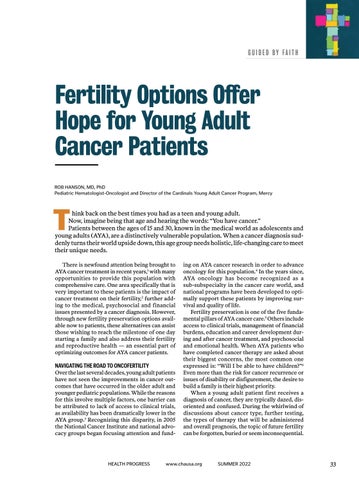GUIDED BY FAITH
Fertility Options Offer Hope for Young Adult Cancer Patients ROB HANSON, MD, PhD Pediatric Hematologist-Oncologist and Director of the Cardinals Young Adult Cancer Program, Mercy
T
hink back on the best times you had as a teen and young adult. Now, imagine being that age and hearing the words: “You have cancer.” Patients between the ages of 15 and 30, known in the medical world as adolescents and young adults (AYA), are a distinctively vulnerable population. When a cancer diagnosis suddenly turns their world upside down, this age group needs holistic, life-changing care to meet their unique needs. There is newfound attention being brought to AYA cancer treatment in recent years,1 with many opportunities to provide this population with comprehensive care. One area specifically that is very important to these patients is the impact of cancer treatment on their fertility,2 further adding to the medical, psychosocial and financial issues presented by a cancer diagnosis. However, through new fertility preservation options available now to patients, these alternatives can assist those wishing to reach the milestone of one day starting a family and also address their fertility and reproductive health — an essential part of optimizing outcomes for AYA cancer patients.
NAVIGATING THE ROAD TO ONCOFERTILITY
Over the last several decades, young adult patients have not seen the improvements in cancer outcomes that have occurred in the older adult and younger pediatric populations. While the reasons for this involve multiple factors, one barrier can be attributed to lack of access to clinical trials, as availability has been dramatically lower in the AYA group.3 Recognizing this disparity, in 2005 the National Cancer Institute and national advocacy groups began focusing attention and fund-
HEALTH PROGRESS
ing on AYA cancer research in order to advance oncology for this population.4 In the years since, AYA oncology has become recognized as a sub-subspecialty in the cancer care world, and national programs have been developed to optimally support these patients by improving survival and quality of life. Fertility preservation is one of the five fundamental pillars of AYA cancer care.5 Others include access to clinical trials, management of financial burdens, education and career development during and after cancer treatment, and psychosocial and emotional health. When AYA patients who have completed cancer therapy are asked about their biggest concerns, the most common one expressed is: “Will I be able to have children?”6 Even more than the risk for cancer recurrence or issues of disability or disfigurement, the desire to build a family is their highest priority. When a young adult patient first receives a diagnosis of cancer, they are typically dazed, disoriented and confused. During the whirlwind of discussions about cancer type, further testing, the types of therapy that will be administered and overall prognosis, the topic of future fertility can be forgotten, buried or seem inconsequential.
www.chausa.org
SUMMER 2022
33
